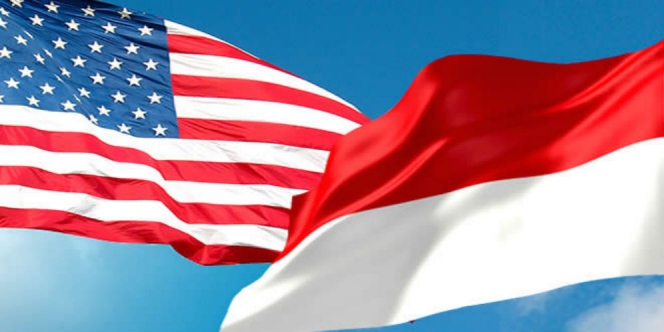
Indonesia Ready to Lobby Textile Tariffs
JAKARTA - The
government will lobby the government to lobby the US government to get special
tariffs for textile products from Indonesia.
Director General of Chemical, Textile and Multifarious Industries
(IKTA) of the Ministry of Industry, Achmad Sigit Dwiwahjono, said the special
tariff demand effort will be delivered in a meeting between the Indonesian
delegation and US authorities in June.
"Every year Indonesia imports 250,000 tons of cotton from the
US We ask for trade-offs For products with cotton raw materials from the US the
tariff when entering [to America] should be low. Now its import duties range
from 8% - 17%," said Sigit, in Jakarta, Tuesday (27/3).
This pattern of commodity exchange becomes a temporary solution
before the multilateral agreement and the blend of US and Indonesia is
achieved. "The hope can be 0% but 5% max 5% is also good," he said.
Meanwhile, related to the trade war between China and the US,
Sigit is seen as a serious challenge for the Indonesian textile industry. The
reason, as much as 35% of China's total production is exported to the US.
"If there are obstacles from the US government, then 10% of
total production dumped into Indonesia will be a serious problem for
[Indonesian Textile Industry]," he said.
Opportunities to fill the US market left by China will not be easy
because the state tariffs imposed on Indonesian textiles are still high.
Data from the Indonesian Textile Association (API) noted that the
market share of Indonesian textile products showed a decline. Currently,
Indonesian products dominate 4.5%, down from 5.2% in 2012. Conversely, US
cotton imports continue to rise.
SOLUTION
Increased exports of Indonesian textile products to the US market
will only be realized if the government solve the energy cost problem from the
port that is still considered high.
API Secretary-General Ernovian G. Ismy said Indonesia's main
competitors in seizing US markets as opposed to China are countries in Asia
such as Vietnam, India to Bangladesh. Indonesia must compete in a lower market
because textile products from China are known for their low prices.
"How to compete [price] with them [country of the region]
then it should be seen the cost structure Do we send expensive American
products to buy?" Of course not, "Ernovian said Tuesday 27/3.
Cheap wages that some time ago could be an advantage in Indonesia
is now over. Indonesia's competitor countries on average have applied the same
wage.
As a result, the current problem shifts to productivity. With
relatively similar wages, countries in the region can produce higher amounts of
garments and textile products.
As illustrated in the API notes, working hours in Malaysia are
2,344 hours per year, India (2,256 hours per year), Vietnam (2,234 hours per
year), Bangladesh (2,208 hours per year), Cambodia (2,152 hours per year),
Pakistan (2,272 hours per year), Sri Lanka (2,054 hours per year), China (1,952
hours per year), while Indonesia (1,816 hours per year).
Ernovian hopes that this long-term cost structure can be solved.
Requires government-specific policies for these industries to grow higher.
In a separate development, subsidiary of PT South Pacific Viscose
(SPV) Lenzing AG, Austria, confirmed the transfer of rayon plant investment
from Indonesia to Thailand, as it did not get certainty of investment support.
Head of Corporate Affairs SPV W. Nugroho Sahib stated in 2017 that
it has met with the Ministry of Industry to request the location and tax
facilities before deciding on additional investments in Indonesia.
"At that time we wanted new investment and asked for a new
location other than Purwakarta, but the government did not provide
certainty," said Nugroho in Jakarta, South Sulawesi.
Different responses were obtained from the Thai government. After
meeting with local authorities, Lenzing immediately got an official letter
regarding tax facilities such as tax allowance and tax holiday up to a special
price for natural gas used by the company. The company finally chose to put its
investment in Thailand. "The Thai factory is targeted to be completed by
2020," he said.
 English
English Japan
Japan

cost of 20 mg cialis how best to take cialis male enhancement pills that work buy viagra online daily cialis not effective can you take viagra daily
viagra prices without insurance viagra naturel what is tadalafil troche crestor and grapefruit adverse effects flu shots near me viagra triangle chicago buy trimix penile injections online vipps pharmacies for generic viagra generic viagra safe pharmacy viagra history what does viagra do for women viagra results time best male supplements for men tadalafil generic best prices viagra meaning women taking viagra side effects how to take cialis for best results is viagra sold over counter viagra en ligne top 10 online pharmacies vipps pharmacies selling viagra sildenafil 20 mg tablet instant natural viagra buy zytenz at walgreens best price tadalafil tablets pfizer pharmaceuticals coupons buying viagra viagra overnight shipping usa walmart coupon policy printable india generic sildenafil viagra otc side effects viagra and alcohol
narcotics online next day delivery get a prescription online viagra online libido max pink viagra super active
protein capsules for elderly seed packages for wedding favors viagra pfizer weight loss medication contrave is there a women s viagra
newest erectile dysfunction medication cheap generic drugs from canada walmart pharmacy coupons new prescription lady viagra valium and grapefruit side effects large print grocery list template